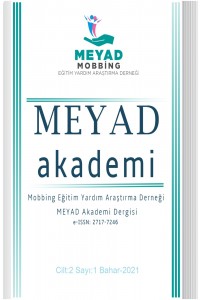Öz
This paper investigated factors affecting quits and dismissals (turnover) based on a sample from a Turkish Statistic Institute 2018 Labor Force Statistics. Overall, the results of the logistics multiple regression analysis revealed that individual variables including gender, marital status, education were significant predictors of the turnover. These predictors accounted for 5.4 percent of the variance in the turnover. Secondly, the results of correlation analysis indicated that the turnover was negatively and significantly correlated with gender, education and marital status. Finally, a significant difference was found that female employees had a higher attitude to quit job compared to male employees (57%) and it pointed out that the rate of dismissal for men (68%) was higher than female employees.
Anahtar Kelimeler
Kaynakça
- Saldanlı, Arif: “Likidite ve Karlılık Arasındaki İlişki – İMKB 100 İmalat Sektörü Üzerine Ampirik Bir Çalışma”, Süleyman Demirel Üniversitesi Sosyal Bilimler Enstitüsü Dergisi, C. 2 (16), 2012: 166-168.
- Alparslan, Emin ve Orhan, Kamil: “İşgücü Kaybının Nedenleri, Etkileri ve Alınabilecek Önlemler: Denizli Kablo ve Tel Üreticisi Bir Firmada Araştırma”, Çalışma İlişkileri Dergisi, C. 7 (2), 2016: 42-47.
- Akgeyik, Tekin: “İstifa ve İşten Çıkarmayı Etkileyen Faktörler (Bir Kimya Fabrikası Örneklemi Üzerine Ampirik Bir Araştırma)”, Sosyal Güvenlik Dergisi, C. 9 (1), 2019: 11-28. Baysal Can, Aysu: “İşletmelerde İşgücü Devri Sorunu”, Erciyes Üniversitesi İktisadi ve İdari Bilimler Fakültesi Dergisi, C. 6 (1), 1984: 81-95.
- Heymann, Marinus: The Impact of Demographics on Voluntary Labour Turnover in South Africa, Master Thesis, University of Pretoria, South Africa, 2010. Çağlın Usta, Özlem ve Bayraktar, Osman: “İşletmelerde Farklılıkların Yönetimi ve İşten Ayrılma Niyetine Etkisi”, İş’te Davranış Dergisi, C. 2 (2), 2017: 68-78.
- Caparros, Antonio and Navarro, M. Lucia: “Factors Affecting Quits and Layoffs in Spain”, Applied Econometrics and International Development, V. 5 (4), 2005: 41-60.
- Giuliano, Laura; Levine, David I., and Jonathan Leonard (2006). Do Race, Age, and Gender Differences Affect Manager-Employee Relations?, IRLE Working Paper (No. 151-07).
- Beenstock, Michael and Klinov, Ruth: “The Determinants of Separatıons From Employment: Israel (1969-1992)”, The Maurice Falk Institute for Economic Research in Israel Discussion Paper, No: 1998 - 35, Isreal
- Orellano, Veronica I. F. and Picchetti, Paulo: “An Analysis of Quit and Dismissal Determinants between 1988 and 1999 using the Bivariate Probit Model”, Brazilian Review of Econometrics, V. 25 (1), 2004: 3-42.
- Eymen, U.Erman: “SPSS 15.0 Veri Analiz Yöntemleri”, SPSS Kullanım Kılavuzu, 2007: 3- 142.
- Şen, Mustafa: “Cinsiyete Dayalı Ücret Eşitsizliğinin Avrupa Birliği ve Türkiye Kapsamında Değerlendirilmesi”, Sosyal Politika Çalışmaları Dergisi, C. 18 (18), 2018: 2148- 9424.
- Ergün Özler, Derya; Giderler Atalay, Ceren ve Dil Şahin, Meltem: “Mobbing’in Örgütsel Bağlılık Üzerine Etkisini Belirlemeye Yönelik Bir Araştırma”, Dumlupınar Üniversitesi Sosyal Bilimler Dergisi, (22), 2015: 1302-1842.
Öz
Bu araştırmanın amacı, TÜİK 2018 Hane Halkı İşgücü İstatistikleri veri seti kapsamında işgücü devrini etkileyen değişkenleri analiz etmektir. Binary
lojistik regresyon analizinin sonuçları, cinsiyet, medeni durum, eğitim süresi gibi bireysel değişkenlerin işgücü devri üzerinde etkili değişkenler olduğunu
göstermektedir. Tüm değişkenler bir arada istifa ve işten çıkarılmadaki değişimi %5,4 oranında açıklayabilmektedir. Araştırmanın bir diğer sonucu,
işgücü devri ile cinsiyet ve eğitim süresi arasında yüksek ve negatif yönlü korelasyon ilişkisi olduğu yönündedir. Nihayet, istatistiksel analizler işgücü
devrinin cinsiyete göre farklılaştığını göstermiştir. Bulgular kadınların erkeklere oranla daha yüksek istifa etme eğilimi (%57) gösterdiğine ve
erkeklerin işten çıkarılma oranlarının (%68) daha yüksek olduğuna işaret etmektedir.
Anahtar Kelimeler
Kaynakça
- Saldanlı, Arif: “Likidite ve Karlılık Arasındaki İlişki – İMKB 100 İmalat Sektörü Üzerine Ampirik Bir Çalışma”, Süleyman Demirel Üniversitesi Sosyal Bilimler Enstitüsü Dergisi, C. 2 (16), 2012: 166-168.
- Alparslan, Emin ve Orhan, Kamil: “İşgücü Kaybının Nedenleri, Etkileri ve Alınabilecek Önlemler: Denizli Kablo ve Tel Üreticisi Bir Firmada Araştırma”, Çalışma İlişkileri Dergisi, C. 7 (2), 2016: 42-47.
- Akgeyik, Tekin: “İstifa ve İşten Çıkarmayı Etkileyen Faktörler (Bir Kimya Fabrikası Örneklemi Üzerine Ampirik Bir Araştırma)”, Sosyal Güvenlik Dergisi, C. 9 (1), 2019: 11-28. Baysal Can, Aysu: “İşletmelerde İşgücü Devri Sorunu”, Erciyes Üniversitesi İktisadi ve İdari Bilimler Fakültesi Dergisi, C. 6 (1), 1984: 81-95.
- Heymann, Marinus: The Impact of Demographics on Voluntary Labour Turnover in South Africa, Master Thesis, University of Pretoria, South Africa, 2010. Çağlın Usta, Özlem ve Bayraktar, Osman: “İşletmelerde Farklılıkların Yönetimi ve İşten Ayrılma Niyetine Etkisi”, İş’te Davranış Dergisi, C. 2 (2), 2017: 68-78.
- Caparros, Antonio and Navarro, M. Lucia: “Factors Affecting Quits and Layoffs in Spain”, Applied Econometrics and International Development, V. 5 (4), 2005: 41-60.
- Giuliano, Laura; Levine, David I., and Jonathan Leonard (2006). Do Race, Age, and Gender Differences Affect Manager-Employee Relations?, IRLE Working Paper (No. 151-07).
- Beenstock, Michael and Klinov, Ruth: “The Determinants of Separatıons From Employment: Israel (1969-1992)”, The Maurice Falk Institute for Economic Research in Israel Discussion Paper, No: 1998 - 35, Isreal
- Orellano, Veronica I. F. and Picchetti, Paulo: “An Analysis of Quit and Dismissal Determinants between 1988 and 1999 using the Bivariate Probit Model”, Brazilian Review of Econometrics, V. 25 (1), 2004: 3-42.
- Eymen, U.Erman: “SPSS 15.0 Veri Analiz Yöntemleri”, SPSS Kullanım Kılavuzu, 2007: 3- 142.
- Şen, Mustafa: “Cinsiyete Dayalı Ücret Eşitsizliğinin Avrupa Birliği ve Türkiye Kapsamında Değerlendirilmesi”, Sosyal Politika Çalışmaları Dergisi, C. 18 (18), 2018: 2148- 9424.
- Ergün Özler, Derya; Giderler Atalay, Ceren ve Dil Şahin, Meltem: “Mobbing’in Örgütsel Bağlılık Üzerine Etkisini Belirlemeye Yönelik Bir Araştırma”, Dumlupınar Üniversitesi Sosyal Bilimler Dergisi, (22), 2015: 1302-1842.
Ayrıntılar
| Birincil Dil | Türkçe |
|---|---|
| Konular | İş Sistemleri |
| Bölüm | Araştırma Makaleleri |
| Yazarlar | |
| Yayımlanma Tarihi | 22 Nisan 2021 |
| Gönderilme Tarihi | 13 Mart 2021 |
| Yayımlandığı Sayı | Yıl 2021 Cilt: 2 Sayı: 1 |


